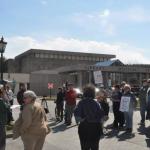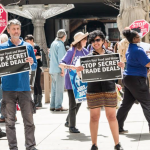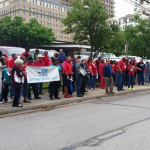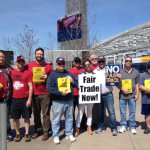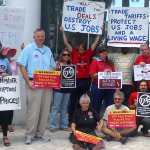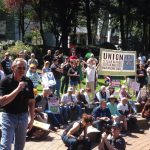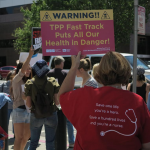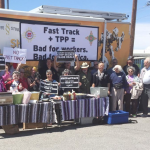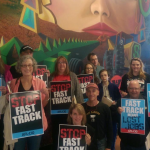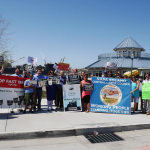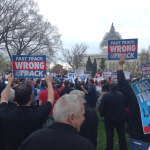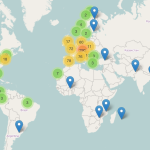Less than 48 hours after legislation was introduced to allow controversial trade pacts such as the Trans-Pacific Partnership (TPP) to be rushed through Congress, labor, environmental and community activists held more than 50 rallies and other actions in cities across the United States opposing it.
“Fast track is dead on arrival in the U.S. Congress,” said Arthur Stamoulis, executive director of Citizens Trade Campaign. “Today’s legislation is the same as last year’s failed fast track bill, which failed to garner enough support to pass the House of Representatives. If anything, public opposition to fast track is even louder and better organized this time around. Most Members of Congress want nothing to do with it.”
The fast track legislation introduced on April 16, 2015 by Representative Paul Ryan (R-WI) and Senator Orrin Hatch (R-UT) would allow the TPP and other pending trade deals to circumvent ordinary Congressional review, amendment and debate procedures. Similar legislation introduced last year died in Congress for lack of support.
.
Before the legislation was even introduced, more than 1,200 trade union, environmental, consumer and faith activists and more than a dozen Members of Congress rallied outside the U.S. Capitol on April 15 to voice their opposition to fast track.
.
On Saturday, April 18, and thereabouts, thousands more turned out for other rallies, block walks, educational events and other actions throughout the country as part of a National Day of Action against the bill. These actions coincided with a global day of action against corporate trade deals that featured hundreds of actions in dozens of countries across six continents.
.
Protesters are not alone. The highest-ranking House Democrat overseeing trade policy recently said, “I’m out to defeat the [Fast Track] bill.”
.
The Ryan-Hatch bill makes only minor adjustments to last year’s Fast Track bill that was dead on arrival in the House. Only eight out of 201 House Democrats supported that bill and House GOP leadership could not count more than 100 members as “yes” votes. Since then, 14 of the 17 new freshman Democrats in the House have signed letters opposing Fast Track, despite pressure from the administration.
.
Activists argue that stopping Fast Track is the single most important contribution those in the United States can make to ending corporate trade agreements that threaten to:
- Destroy livelihoods and accelerate the global race to the bottom in wages and working conditions
- Further commodify agriculture, trample food sovereignty, hurt small farmers and contribute to forced migration
- Enable new corporate attacks on democratically-enacted environmental and consumer protections
- Undermine global economic stability by prohibiting effective regulation of financial markets
- Reduce access to life-saving generic medications, increase the cost of prescriptions and restrict freedom on the Internet
Click here to write Congress opposing the Ryan-Hatch Fast Track bill.
- Augusta, ME
- Chicago, IL
- Dallas, TX
- Minneapolis, MN
- Pembroke Pines, FL
- Portland, OR
- Sacramento, CA
- Santa Fe, NM
- Seattle, WA
- Vallejo, CA
- Washington, DC
- Global Event Map

